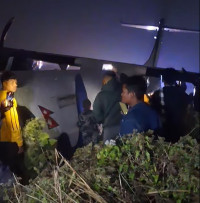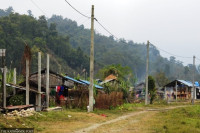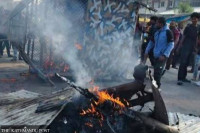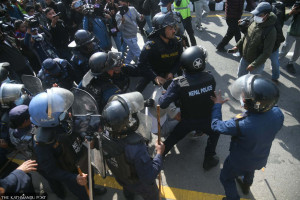National
Nepal Police restructuring: Officials express strong concerns over provisions
The Nepal Police has voiced strong reservation over transfer and promotion provisions in the proposed organisational restructuring of the security agency under the federal set-up.
The Nepal Police has voiced strong reservation over transfer and promotion provisions in the proposed organisational restructuring of the security agency under the federal set-up.
The proposal drafted by a team led by former Inspector General of Police Kuber Singh Rana has suggested that the transfer and promotion shall take place only within the province where the concerned officials are serving. The Nepal Police is also against a proposal of hiring personnel both at the provincial and central levels.
Inspector General of Police Upendra Kanta Aryal had told the drafting committee members on Tuesday that these provisions could invite serious conflicts within the institution. He argued that the lack of promotion and transfer within provinces will demotivate officials and eventually hit on the institutional fabric of Nepal Police. The taskforce that drafted the restructuring report had shared the contents with the chief of police and other officials on Tuesday.
Several police officials present at the meeting, including a Deputy Superintendent of Police, had expressed fear that such stringent provisions would only diminish the charm of police services.
Speaking to the Post, former IGP Rana said they would collect some more feedback before submitting a report.
According to the proposal, a Deputy Inspector General of Police of a province will not be eligible to be the Chief of Central Police and vice versa. The proposed structure would also centralise most of the power, including crime investigation in the central police, raising questions about the role and status of the provincial police forces.
During an interaction on Monday, security experts had suggested the taskforce include provisions such that only disputed cases will be handled by the Central
Police. They argued that micro-managing the provincial police will have a long-term consequences, eventually affecting the law and order enforcement.
The ZPO had long remained an obsolete body whose task basically was to monitor and evaluate the performance of its subordinate bodies.

The police headquarters, following the recommendation of Crime Investigation Department, directed the ZPOs to actively support DPOs in their investigation and monitor their performance. It has mandated the ZPOs also to look seriously into cases of women and children, working as part of community policing.
In the past, the ZPOs even had the authority to issue vehicle licence which was later transferred to the Department of Transport Management.
“Apart from working as a monitoring unit, it will support districts in crime investigation and also look into old cases,” said chief of CID Additional Inspector General (AIG) of Police Bigyan Raj Sharma. “They will be an active part of community policing. This way, we hope the zonal police offices will be more functional and effective.”
The ZPOs have a team of around 200 police officials and are led by Senior Superintendent of Police (SSPs). However, the DPOs have often been contacting the headquarters and other police units bypassing the ZPOs.
Former AIG Nawaraj Dhakal believes “inferiority complex” felt by ZPOs chiefs has eventually made it ineffective. “The zonal offices are taken as a place for hibernation despite having an important task of monitoring and evaluating the officers on the ground. This evaluation plays a major role in the promotion of the officers,” said Dhakal.
The Deputy Inspector General (DIGs) at the Regional Police Offices too deal directly with the police on the ground, breeding a culture of neglecting the ZPOs, said Dhakal.
“Now the headquarters should effectively implement its decision and make zonal police offices more functional and visible.”




 8.12°C Kathmandu
8.12°C Kathmandu









%20(1).jpg&w=300&height=200)



